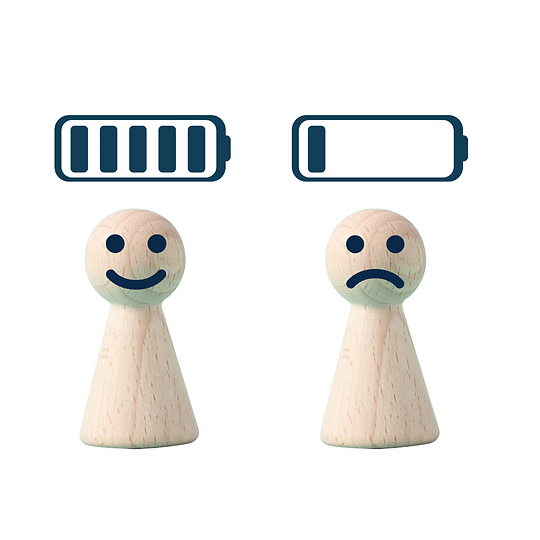Every one of us has an emotional battery, a battery that can be full, low, or constantly charging. When our battery is fully charged, we can more easily experience joy, curiosity, creativity, calmness, and social connection. However, when our batteries are running on empty, we are more likely to feel stressed out, irritable, disconnected, defensive, and anxious. Our emotional battery can be charged through a range of feelings, thoughts, and behaviors, while certain daily activities drain it and hinder our ability to recharge.
Consider how diligent you are at ensuring your phone battery stays charged. In fact, I bet right now you could accurately guess if your phone has a low charge, medium charge, or is fully charged, without even looking. How often are you assessing your own battery? Charging your emotional battery involves taking deliberate actions to replenish and enhance your emotional well-being. Are you making sure you are plugged in? Are you missing the outlet completely?
Examine how you charge your emotional battery, are you:
1) Plugged into a weak signal?
Our world today is changing much quicker than our minds and brains can process. We have become multitaskers to a fault, packing in much more than is healthy or productive. We skip meals, survive on caffeine, listen to our true crime podcasts, fill up our to-do lists, and then wonder why we feel anxious and tired. Our thoughts and behaviors may have good intentions, but we are draining our battery much quicker than we are filling it up.
Examples of being plugged into a weak signal:
- People pleasing behaviors
- Not prioritizing relationships with self/others over work/tasks
- Using social media to connect
- Never saying no
- Making assumptions about other’s thoughts/actions
- Avoiding needs by distraction
2) Charging Dangerously?
When our battery is depleted, sometimes we look for a quick charge to make us feel better fast. Quick charges are typically unhealthy coping strategies that are meant to either numb or distract us from an unwanted emotional state. The problem is, these quick charge behaviors are not safe, secure, or stable. Charging dangerously may make us feel good for a brief and limited time, but afterwards we fall quickly back to an empty battery. This can start a cycle of continual bad behaviors, or addiction, that make joy feel like an illusion or a craving, instead of a consistent and reliable emotional state.
Examples of charging dangerously:
- Drinking to excess, using marijuana to relax, or other illicit drug use
- Adulterous thoughts/actions, or the use of pornography
- Turning to sweets or junk food
- Endless scrolling on your phone
- Stealing, cheating, or lying
3) Missing the Outlet?
We can’t charge our batteries when we are holding on to guilt, shame, resentment, anger, or other self-limiting beliefs. We may desire and think of joy, energy, connection, and happiness as things we want, but get stuck in an emotional state where we don’t feel worthy. If you don’t know this yet, you deserve to be fully charged, and to experience a full emotional battery!
Examples of missing the outlet:
- Not forgiving past wrongdoings
- Neglecting self-care
- Using destructive language (i.e. gossip, blaming, comparisons)
- Taking the behaviors of other’s personally
- Trying to fix everyone else’s crisis or imperfections
- Holding on to past mistakes
- Criticizing yourself
4) Plugged In and Connected?
The only limits we have on experiencing a fully charged emotional battery, are the limits we intentionally or unintentionally put on ourselves. But just as we can avoid the feelings, thoughts, and behaviors that keep us from recharging, there are many things we can do to plug in and feel connected.
Examples of how we can plug in safely:
- Love and be kind to yourself
- Nurture your relationships
- Set boundaries with work and other people’s expectations
- Letting go of trying to manage others
- Connect in community
- Express emotions with others or through writing
- Eat a healthy, well-balanced diet (stay hydrated!)
- Exercise and move your body
- Let go of trying to fix others
- Learn how to communicate your needs with those that care about you
- Participate in acts of service
- Connect spiritually
- Get outside in nature and get sunlight daily
- Prioritize quality sleep time
- Meditate and practice deep breathing
- Play, adults need to do fun activities too
- Find a safe way to let off steam
- Love and be kind to yourself, this is mentioned twice on purpose 😊
Charging your emotional battery is not a one time fill up, it’s a lifelong journey. It requires ongoing commitment, patience, and self-compassion. It’s about finding what works for you, creating a routine that supports your well-being, and adapting as your needs change over time. Caring for ourselves empowers us to develop greater resilience and the capacity to embody our fullest potential.

